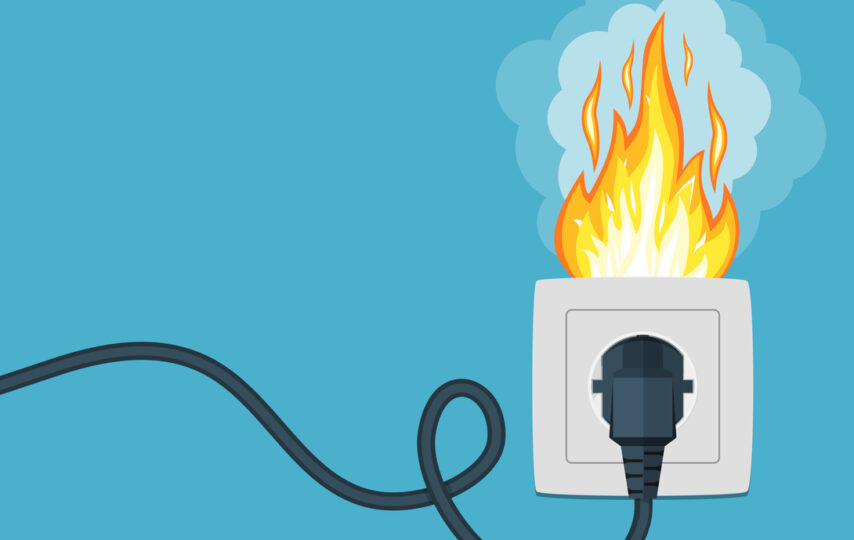Electrical safety is a very serious matter. Electricity is one of the most important power sources that we use every single day. If not properly handled and managed, it can cause serious injury and possibly death.
Electrical workers are at risk of injury on the job every single day. The risks associated with using electricity must be controlled and the control measures need to be clearly communicated.
Serious statistics show just how dangerous the conditions can be for electrical workers. Between the years of 2003 – 2015:
- 142 electrical workers died from contact with electricity (average of 11 people each year)
- 87% of these deaths happened during electrical infrastructure installation (123 people)
- Almost half of worker deaths occurred in the construction industry
The statistics are stunning.
Electricity Risks
The risk of being injured or killed from electricity is strongly correlated to how and where the electricity is used. The risk is increased if it is used in the following ways:
- Used in damp surroundings where equipment may become wet and possibly at a greater risk of becoming damaged
- Used outdoors
- Used with earthed metalwork in cramped areas (i.e., if inside of a bin or tank, the possibility of receiving an electrical shock would be greater if an electrical fault is developed)
There is also increased risk involved with certain types of equipment:
- Using extension leads, specifically those leads connected to equipment that is moved frequently, can cause an increased risk, possibly leading to injury
- Various types of portable electrical equipment, such as plugs, sockets, and electrical connections to the cable are also vulnerable to damage
Work Related Safety and Health Duties
The PCBU’s (the person conducting a business or undertaking) are responsible for managing the electrical risks at the workplace. They are tasked with eliminating the risks, as far as is reasonably practicable or, if that isn’t possible, minimising the risk as much as possible.
Workplaces with Higher Risks
Each workplace situation will be different. Certain workplace situations will require additional duties to manage the electrical risks. Workplaces with higher risks using electrical equipment must:
- Have the electrical equipment regularly tested
- Use residual-current devices (RCD’s)
Workplaces with higher risk are those workplaces where operating conditions are likely to damage the equipment or reduce the equipment’s life span. Conditions that expose the equipment to vibration, heat, moisture, mechanical damage, corrosive chemicals, and dust. Examples of these conditions include:
- Workplaces using corrosive substances
- Commercial kitchens
- Outdoors
- Wet or dusty areas
- Manufacturing environments
All businesses need to have insurance to protect themselves. Electrical related businesses, with the high risks associated with them and accidents in the workplace, definitely need to have suitable insurance in place.
Electricians insurance is designed to protect you, your business and your staff against compensation awarded for negligence for personal injury or property damage, as well as the costs of defending a claim. Not only do you need to ensure that you have the correct type of protection, you will also want to make sure you are getting the balance between cover and cost.
It’s a good idea to get several quotes to compare the costs, as well as the level and types of cover offered by various companies. Public Liability Insurance Australia can offer you free, multiple quotes so you can compare policies without the need to ring around or visit numerous websites. You can get immediate coverage, with no tricky paperwork, and your policy documents are emailed to you instantly.
Inspecting, Testing and Tagging
Conducting regular inspection and testing of electrical equipment can save lives and reduce injuries. Inspections help identify possible damage, electrical faults, and wear. Electrical defects can be observed by examining them, however regular inspection and testing will make sure that electrical faults are detected, as well as possible deterioration that cannot be seen.
These inspections must be conducted by a someone with specific qualifications. Be sure to check with your jurisdiction to determine if they are required to be a registered electrician or a licensed electrical inspector.
Inspection and detection can help you meet your work, health and safety duty to ensure electrical equipment is safe.
RCD’s (Residual-Current Devices)
RCD’s are electrical safety devices that immediately switch off the electricity supply when it is determined that electricity is leaking to the ground and is detected at a level that is harmful to the user of the electrical equipment. RCD’s are also known as safety switches.
RCD’s are required if the electrical equipment being used in your workplace is:
- Being utilised by plug-in equipment, such as using a socket outlet
- Being used in certain conditions which may likely damage or reduce the equipment’s life span
Electricity Lines – Underground and Overhead
The risks need to be assessed before beginning any work near underground and overhead lines. A plan needs to be in place regarding how these risks will be managed
For underground lines you must:
- Talk to the asset owners
- Use insulated hand tools
- Identify cable locations (such as repairing potholes)
For overhead lines you must assess:
- The nature, height, and shapes of the loads
- The heights, sway, and sag of the lines
- Approach distances and work zones
Use Dial Before You Dig
Dial Before You Dig is a free national referral service that is designed to prevent damage and disruption to the underground pipes and cable networks that provide Australia’s essential services. Included is these assets are electrical cables. Dial Before You Dig serves as a single point of contact to get accurate information regarding the location of underground electrical cables, as well as other possible asset networks at your work site. With this service, there’s no need to contact individual underground asset organisations – Dial Before You Dig can provide the information you need in one call.
For any other questions regarding electrical safety, please contact the electrical regulator in your territory or state.
Public Liability Insurance has access to a network of insurance companies and can quickly provide you many policy options to choose from to secure the most suitable insurance to your business. For additional information regarding the importance of insuring your business, please see https://www.publicliability-australia.com.au/insurance-for-electricians/.



